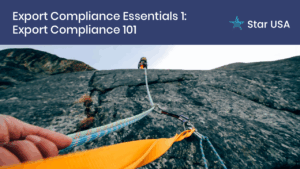Turn compliance into action. Protect your business. Take the foundations of export compliance and turn them into a practical program for your company. This session covers classification, screening, licensing, recordkeeping, training, and internal audits, with real-world examples and practical templates.…
A Path to Compliance: Understanding Prior Disclosures
A Path to Compliance: Understanding Prior Disclosures
In the realm of international trade, importers must adhere to a myriad of regulations set forth by U.S. Customs and Border Protection (CBP) to ensure compliance with customs laws. In cases where errors or omissions are identified, the Prior Disclosure process provides importers with a mechanism to voluntarily disclose such discrepancies to CBP.
Introduction: The Prior Disclosure process enables importers to voluntarily report errors, discrepancies, or omissions in their import transactions to CBP. By self-disclosing such issues, importers demonstrate transparency, integrity, and a commitment to compliance with customs laws and regulations.
Key Points:
- Legal Framework: The Prior Disclosure process is governed by CBP regulations and guidelines. Importers are encouraged to promptly disclose any errors or discrepancies in their import transactions to CBP. This proactive approach allows importers to rectify mistakes and mitigate potential penalties.
- Scope of Disclosures: Prior Disclosures can encompass a wide range of issues, including incorrect tariff classifications, undervaluation of goods, inaccurate country-of-origin declarations, and lapses in record-keeping. Identifying and addressing these issues through self-disclosure allows importers to rectify errors and prevent future compliance lapses.
- Benefits of Prior Disclosures: The Prior Disclosure process offers several benefits for importers, including the potential reduction of penalties, mitigation of enforcement actions, and preservation of trade privileges. By voluntarily disclosing errors, importers may receive favorable treatment from CBP, demonstrating a commitment to compliance and cooperation.
Best Practices for Implementation:
- Internal Compliance Programs: Establishing robust internal compliance programs is essential for identifying and addressing potential customs violations. Importers should train employees, conduct regular audits, and implement effective controls to prevent errors and facilitate early detection of compliance issues.
- Timely Reporting: Prompt reporting of potential violations is crucial for the effectiveness of Prior Disclosures. Importers should promptly investigate and assess the severity of any compliance discrepancies and submit Prior Disclosures to CBP in a timely manner to demonstrate good faith and cooperation.
- Cooperation with CBP: Cooperation with CBP during the Prior Disclosure process is key to achieving favorable outcomes. Importers should fully cooperate with CBP investigators, provide accurate and complete information, and implement corrective actions to address identified issues.
Conclusion: The Prior Disclosure process serves as a vital tool for importers to maintain compliance with U.S. Customs regulations. By voluntarily reporting errors or discrepancies, importers demonstrate transparency, integrity, and a commitment to compliance. Implementing robust internal compliance programs, promptly identifying and addressing compliance discrepancies, and cooperating with CBP during the Prior Disclosure process are essential for achieving favorable outcomes and safeguarding trade privileges.
Sources:
Related Posts
Year-End Trade Compliance Checklist: Prepare for a Successful Year Ahead
Nic Arters Director, Star USA As our Star USA team ramps up to next year, I can’t help but reflect on the trade compliance landscape of 2025. The global trade landscape shifted with new regulations, evolving sanctions, and technological advancements, making trade compliance a moving target. Next year looks like it will be similar. …
The End of De Minimis – What does it mean for your business?
Nic Arters Director, Star USA Overview For years, Section 321 allowed for one shipment per person or business per day that was valued at or under $800.00 USD to be imported duty free or “sectioned.” However, this exemption has been deemed to be a “loophole” that will cease to exist on August 29th, 2025, following…
Top 5 Traits of Businesses that Execute Successful Trade Compliance Strategy
Michael D. Easton President & General Manager, Star USA If you think trade compliance strategy is just about checking boxes, you’re missing what the top-performing companies already know: it’s one of the smartest operational investments a business can make. In my work with global supply chain leaders, one pattern stands out. Companies that excel at…
What is Proactive Trade Compliance & How Does it Benefit Your Business?
Nic Arters Director, Star USA When the next disruption strikes your supply chain (and it will), will your company pivot or pause? I’ve spent years assisting businesses navigate the evolving maze of trade regulations, and if there’s one truth I’ve learned, it’s this: reactive compliance is no longer good enough. With global trade becoming more…


